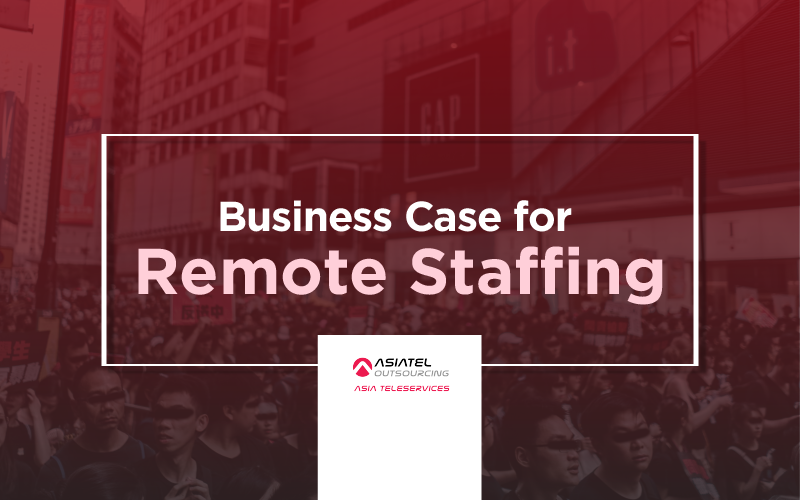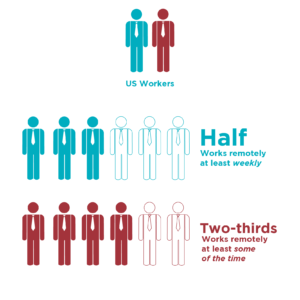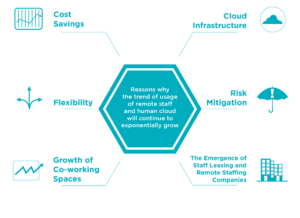
The future of the workplace is about to undergo a revolution. With the rapid adoption of the Internet, smartphones and social media, we have witnessed how the online businesses, shared economy and sheer power of information have disrupted traditional businesses. The future of the workplace is not going to be any different and disruption is inevitable. The enterprises must wake up to realities lying ahead and gear up to operate in the brave new corporate world. Remote staffing, telecommuting, virtual teams, freelancing and gig economy are changing the landscape of the workplace.
Remote Staffing or Offshoring has gained a lot of significance in recent times, with more companies open to having remote teams working exclusively for them. As per the report ‘State of Remote Work 2019’ published by Owl Labs and Global Workplace Analytics, “Remote staffing is not the future of work – it is the present”. In its key findings, the report states “Nearly two-thirds of U.S. workers polled said they work remotely at least some of the time. Nearly half do so at least weekly“. This is an important statistic, that change is on its way.

The offshoring industry size is hard to exactly pinpoint as it comes under two different categories – one being the traditional Business Process Outsourcing (BPO) market, which does end up hiring remote workers through a BPO company. The market size of the BPO industry is expected to about US$ 350 Bn by 2025 as per a report of Grand View Research Inc. In addition to the pie that falls into the BPO sector, further as per the report of Staffing Industry Analysts (SIA), the services that are coming in form of freelancing or the Gig economy has led to a new term called as the “Human Cloud” and as per the SIA report, the money spent in 2018 on the Human Cloud was US$ 82 Bn.
The recent protests in Hong Kong have really brought this point in focus that for a non-disruptive business working having a remote or offshore team is a big hedge in terms of geographic risks and also serves as a business continuity plan (BCP) for the human resources. The protests from November 11, 2019 have intensified in Hong Kong and some of the staff have not been able to make it to the offices due to disruption in transportation due to protests.
The numbers as stated above are staggering and there are some other valid reasons that trend of usage of remote staff and human cloud will continue to exponentially grow:

1. Cost Savings (the cliché that still holds true) – the cost savings due to Offshoring can be anywhere between 60 to 75% if both salary costs and rent are taken into accounts. This attractiveness still holds true and there will be enterprises that will continue to pick the arbitrage.
2. Cloud Infrastructure – has made remote staff and virtual teams as functional as any other team in the office. In addition to that cloud infrastructure brings the advantage of security, redundancy and makes technology a part of operating expenditure.
3. Flexibility – more enterprises will use professional services on demand and tap the human cloud to keep their fixed operating costs low and bring about flexibility in their operations. This approach will create lean and nimble organizations that can steer a downturn much better than white elephants.
4. Risk Mitigation – while large enterprises lay a huge focus on Business Continuity Planning (BCP) and have resources to do that, SME’s can hedge their geographical risks by creating remote teams across the different parts of the world. This takes care of the human resources and with their cloud technology, they can overall cover the key components of the BCP plan.
5. Growth of Co-working spaces – with the growth of the shared economy and co-working spaces, the entrepreneurs do not need to huge capex for setting up an offshore team. This will further enhance the propensity to build offshore teams.
6. The emergence of Staff Leasing and Remote Staffing companies – this takes away the other impediment including the legal hassles and startup costs of setting up a foreign subsidiary in the Philippines or India or East Europe. With a combination of points 5 and 6, the enterprises can in a jiffy set up an offshore/remote team exclusively working for them. The staff leasing and remote staffing companies recruit and provide manpower as sought by the client.
Hong Kong enterprises (that are currently impacted by the protests) have a partial quick fix and they can set up offshore teams in the Philippines using many offshoring vendors, remote staffing companies and partially overcome the bottlenecks that may lie ahead. This is just one case in point, however, the future of the workplace as highlighted above and with expected growth in the Human cloud, all prudent enterprises should start looking at the global economy as a whole. Remote staffing or virtual teams is a strategic business tool that enterprises of tomorrow must use and differentiate from their competitors. In the words of Former Singapore Prime Minister, Late Lee Kuan Yew, “If you deprive yourself of outsourcing and your competitors do not, you’re putting yourself out of business.”
The change is coming, is your enterprise ready?
Written by Jasjit Singh Anand (Andy)
Jas is an Offshoring expert who has assisted many international companies set up their offshore team in Philippines. You may reach out to him at andy@athl.com.hk for comments or consultation.
